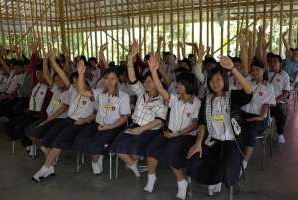Educating the Poor: Social Entrepreneur Style
By Karina Veal, Asian Development Bank.

Students of Mechai Pattana Bamboo School in Buriram, Thailand © ADB
In common with the best international schools, Year 10 students at the school established in Burriam, Thailand by former Senator Mechai Viravaidya, spend a year away from home (in this case, to the Thai beach resort area of Pattaya). There they experience a different culture, gain independence, and develop teamwork as they transition to young adults.
The Year 10 year-away is not the only good educational practice from ‘The Bamboo School’, as Viravaidya’s educational institute is known. The school models student-centered learning and has also made a radical shift in their school week with classes held from Thursdays through Mondays, thus allowing exceptional teachers from Bangkok and elsewhere to come and volunteer intensive specialist weekend classes in the rural setting.
In terms of Mechai Viravaidya’s wish to see these young people develop their potential (“I do not believe in giving money to the poor but rather to help the poor make money,” he says), there is a strong emphasis on developing creativity, leadership, and independence; expecting children to help run the business side of the school; and offering targeted vocational improvement sessions for parents. Educational attainment rates are high, and with the related emphasis on social development, there is no reason why the graduates from this new school (established 2008) should not go on to achieve in many settings.
And the annual school fees for all this? Each school family ‘pays’ an annual 365 hours of labor to the school or surrounding community and plants 365 trees in the community. With ‘fees’ in this impoverished district coming not in monetary terms but through labor, the day-to-day running costs dramatically decrease (though the school also attracts donations from external sources for certain costs) and family commitment to the school their children attend increases.
Examples of innovative business models in education are worth celebrating.
Whilst Mechai Viravaidya’s focus is on exceptional quality of education in one district, Achyuta Samanta, founded the Kalinga Institute of Social Sciences (KISS) in Odisha, India, with a vision of scale.
Already his institute offers free food, accommodation, health care, and education in an integrated campus for 20,000 students from poor tribal families, and he has plans to educate 2 million more young people from tribal backgrounds over the coming decade. Odisha is one of the poorest states in India and has high numbers of people from indigenous ‘scheduled tribes’ who continue to live in abject poverty. His business model is based on cross-subsidization. First, he built KIIT, a private, highly profitable university, recognized as the best in the state. Starting with engineering (the perennial favorite in India) KIIT went on to offer biosciences, management and law, attracting top faculty from international and national universities with salaries at double or treble the going Indian rate. Next, he started KISS, using profits from the university. Now the two separate though related institutions grow in parallel. Annual recurrent costs are funded by five percent of the profits of KIIT, three percent of the donated salaries from the university faculty, two percent of the profits from associated contractors and vendors, and the remainder from government and non-government funds.
President of Centurion University and Gram Tarang Employability Training Services, Mukti Mishra, is the third social entrepreneur I’ll mention today. Also in Odisha (what’s in the water?) he runs job-linked vocational training to poor and mostly tribal young people at a campus in the capital, Bhubaneswar, and vocational and higher technical courses to an entirely tribal student population of 1,200 at a campus in Maoist-affected district Gajapati, five hours from Bhubaneswar. All his courses are residential. Even if the student lives nearby, Mishra says that preparing them for the world of work (which will likely involve migrating away from home) can be done better in a community of young people looking forward to their future.
Mukti Mishra’s business model is based on slender margins but high yield (the vocational training centre trains 10,000 students per year). They keep costs down with simple facilities and tightly managed economies of scale. In line with the ‘fortune at the bottom of the pyramid’ Mishra defies the assumption that sustainable businesses can’t be focused on the needs of poor people. They have developed close ties with industry and have high placement rates and are recognized by the Confederation of Indian Industry as a trail blazer, and by the UN Secretary General’s Education Report as an innovator of note. One of their key innovation factors is the tie-up they directly negotiate with major employers, usually out-of-state, whereby the employer or their agent will come to the campus and select whole groups of young people for jobs, and the group of students will travel together and live together as they settle into their new life. Sometimes, a local cook is sent along with the group.
All three of these schools are established by visionary leaders, all three are ‘first generation’ schools and have obtained remarkable growth from start-up to now. All three share a passionate belief in the transformational power of education coupled with a commitment to social entrepreneurial business models. And all three understand the importance of close community ties, if families are to value their children’s commitment to education.
The ‘Bamboo School’ of educational excellence in rural Thailand? To maintain cross-generational connection to family rice farming activities, it closes during rice planting and harvesting seasons.
Karina Veal is a Senior Social Sector Specialist in the South Asia Department of the Asian Development Bank. Email: kveal@adb.org
This post appeared on 11th April 2013 on ADB’s Asian Development Blog.
